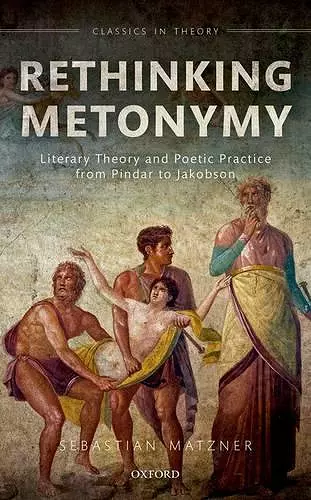Rethinking Metonymy
Literary Theory and Poetic Practice from Pindar to Jakobson
Format:Hardback
Publisher:Oxford University Press
Published:29th Sep '16
Currently unavailable, and unfortunately no date known when it will be back
This hardback is available in another edition too:
- Paperback£26.49(9780198724285)

Although metonymy has long been recognized as being a central device in poetic language, it has received little critical attention in its own right. Not only has this created a gap in literary analytical scholarship which needs to be addressed, but it has also allowed for problematic appropriations of metonymy as a critical concept now widely in use in structuralist studies across the humanities. Rethinking Metonymy is the first monograph to confront and resolve these issues. It advances the theory of poetic language by developing a ground-breaking new definition of metonymy on the basis of an evaluation of examples in Greek tragedy and lyric poetry, considering these in conjunction with examples from classicizing and Romantic German poetry for the purposes of illustration and comparison, including works by Goethe, Schiller, and Hölderlin. In addition to establishing the fundamental principle, different conformations, and aesthetic effects of this important poetic device, the volume also demonstrates how the new arguments it offers have the potential to set an agenda for far-reaching reconsiderations in literary studies and beyond. It mobilizes analytical insights into the inner workings of metonymy by examining three case studies designed to explore the trope in critical practice, covering its role in creating a 'hellenizing' style, what happens to it in 'classic' German translations of Aeschylus' Agamemnon, and critically re-assessing its modern re-appropriations as a structural-semiotic paradigm. Connecting classical perspectives with modern linguistic and literary theory, Rethinking Metonymy is a compelling and authoritative analysis that rehabilitates and brings much-needed clarity to an oft-neglected literary device. Its combination of in-depth engagement with classical literature and cross-cultural and cross-linguistic comparison makes it an invaluable resource not only to specialists in Greek poetry, but also to students and scholars engaged in literary analysis, translation criticism, and structuralist studies across a much wider range of disciplines.
This important book sheds light on four quite different fields: Greek poetic usage in its greatest age, and German, in its; translation studies; and, above all, poetic theory. The most important outcome is a new and greatly enhanced understanding of metonymy. Crucially, Matzner's theory of metonymy insists on the primacy of literary usage, and he conducts his theorizing, as all such theorizing should be conducted, as a negotiation between existing theory and significant literary instances. In the process, the limitations of existing theory— still stuck in the world of Greco-Roman rhetoric, with or without some pointers (but little more) from Roman Jakobson and some distractions from cognitive linguistics—are patiently, lucidly, and sensitively exposed. This is a work of great acumen and striking originality. * Professor Michael Silk, King's College London *
Matzner's study makes a unique contribution to ancient literary criticism and rhetorical theory, and to theories of metaphor and figurative language more generally. A great strength of his approach lies in his deft orchestration of a Formalist focus on usage and aesthetic aspects of metonymy that produces a far-ranging and focused analysis. As the trope is central to ancient imagery, and yet has been poorly understood since Aristotle, we should be all the more grateful to Matzner for his lucid approach to key problems in defining its parameters and illuminating its intricacies. * Professor Nancy Worman, Barnard College and Columbia University *
ISBN: 9780198724278
Dimensions: 223mm x 142mm x 23mm
Weight: 514g
322 pages